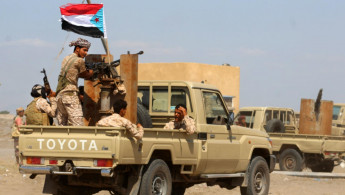Saudi-led coalition rejects UAE-backed southern separatists 'self-rule' declaration
The separatists' move complicates a long and separate conflict, fought by the coalition and the internationally recognised government, against Houthi rebels who control much of the north.
Yemen's separatists signed a power-sharing deal in Riyadh last November that quelled a battle - dubbed a "civil war within a civil war" - for the south that had in August seen them seize control of the second city of Aden.
"We stress the need to restore conditions to their previous state in the interim capital Aden," the coalition said according to tweets from the official Saudi Press Agency.
"Following the surprising announcement of a state of emergency by the Southern Transitional Council, we re-emphasise the need to promptly implement the Riyadh Agreement," it said.
The STC, which is backed by key coalition partner the United Arab Emirates, on Sunday declared self-rule in southern Yemen, accusing the government of failing to perform its duties and of "conspiring" against the southern cause.
The Riyadh pact had been hailed as averting the complete break-up of the country, but with a lack of implementation, observers have said it is effectively defunct.
"The Coalition has and will continue to undertake practical and systematic steps to implement the Riyadh Agreement between the parties to unite Yemeni ranks, restore state institution and combat the scourge of terrorism," the Saudi-led coalition said.
"The Coalition demands an end to any escalatory actions and calls for return to the Agreement by the participating parties."
Yemen’s internationally-recognised government has also condemned the move and said the separatists - who have long agitated for independence in the south - would be responsible for the "catastrophic and dangerous" outcome.
Twitter Post
|
The breakdown between the one-time allies comes as a Saudi-led coalition, which backs the internationally recognised government in a battle against the Houthi rebels, has extended a unilateral ceasefire aimed at fending off the coronavirus pandemic - a move rejected by the Houthis.
The STC announced in its statement that it was declaring "self-governance in the south starting midnight on Saturday April 25th, 2020.
"A self governing committee will start its work according to a list of tasks assigned by the council's presidency," it said.
Aden residents reported heavy deployments of STC forces in the city and a separatist source told AFP they had set up checkpoints "at all government facilities, including the central bank and port of Aden".
Military vehicles drove through the city with STC flags flying aloft.
The political landscape in the south is complex, and despite the STC's declaration some southern cities, including Socotra, Al-Mahrah and Hadramout, said they did not recognise the call to self-rule and would remain aligned with the central government.
Yemen's Foreign Minister Mohammad al-Hadhrami said the STC move was "a continuation of the armed rebellion last August and a declaration of rejection" of the Riyadh agreement.
Deep divisions
More than 100,000 have been killed since the Saudi-led coalition intervened five years ago to back the internationally-recognised government of Abedrabbo Mansour Hadi against the rebels.
Read also: Yemen in Focus: PM appeals for assistance after 'disastrous' Aden flooding
The STC’s announcement came after at least 21 people were killed in flash flooding this month, with Aden's streets submerged and homes destroyed.
Hundreds of angry protesters took to the streets of Aden after electricity was cut in the city for four consecutive days due to the flooding.
On Friday evening and the early hours of Saturday morning, the protesters cut off several roads in the city and burned tires in the street.
They also tried to set fire to government buildings, burning one of the main doors of a building belonging to the government's statistics office in the Tawahi area.
In an attempt to placate the protesters, the government announced on Saturday that electricity would gradually return to Aden.
It said on Twitter that the Haswa power station had returned to service and that this would reduce the number of hours that the city would be without electricity,
Aden has suffered from a lack of essential services for a long time.
The southern separatists claim that the Yemeni government is imposing collective punishment on the population of Aden by neglecting public services.
The UAE, like the STC, has a zero tolerance policy towards the Muslim Brotherhood and Yemen's Brotherhood-influenced Al-Islah party, which has representatives in the internationally recognised government.
The tussle for control of the south, including the deadly clashes that broke out between Saudi-backed government and UAE-backed STC forces who seized control of Aden last year, exposed divisions between the coalition partners.
While the government and the STC are technically allies in the long war against the Houthis, the secessionists believe the south should be an independent state - as it was before unification in 1990.
Agencies contributed to this report.
Follow us on Facebook, Twitter and Instagram to stay connected





 Follow the Middle East's top stories in English at The New Arab on Google News
Follow the Middle East's top stories in English at The New Arab on Google News


